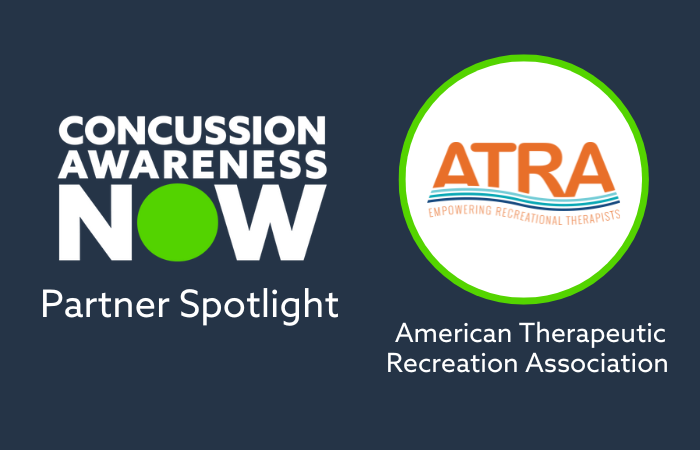When most people think about aftercare after a concussion or a traumatic brain injury, physical therapy or occupational therapy is what might immediately come to mind. There’s also another powerful form of therapy that focuses on something equally essential—something that helps people reconnect or find what makes their lives meaningful and joyful: recreational therapy.
“Recreation is right in the word itself,” says Tara Shibbani, a recreational therapist and marketing coordinator for the American Therapeutic Recreation Association (ATRA), the national professional organization representing recreational therapists in the United States. With approximately 18,000 to 21,000 recreational therapists nationwide, ATRA works to empower these healthcare professionals who make a unique impact in rehabilitation and recovery.
“Recreation is anything that allows us to refresh and recreate ourselves. It’s something that we do during our free time that brings us purpose and joy,” Shibbani says.
ATRA’s definition of recreational therapy—also known as therapeutic recreation—is “a systematic process that utilizes recreation and other activity-based interventions to address the assessed needs of individuals with illnesses or disabling conditions, as a means to psychological and physical health, recovery, and well-being.”
When asked what counts as recreation, Shibbani simply says, “So much.” For one person, it might be feeding and watching birds. For another, it might be leaning into their creative side and experimenting with photography or painting. Another might be into playing team sports. Whatever the “recreation” may be, the goal is to use a person’s interests and strengths to support their recovery. “It’s a very individualized process, which is what makes this type of therapy so unique,” she says.
Navigating the search for meaning after brain injury
“Brain injury is a life-changing experience,” Shibbiani says. “It can change everything that we know to be true about ourselves, the way we access the things that used to bring us joy, and in many cases, it can change altogether what gives our lives meaning.”
The process of recreational therapy often begins during hospitalization after a concussion or brain injury, where therapists may use recreation and leisure activities to work toward wellness goals. As Shibbani explains, recreational therapists in a hospital setting begin “that process of looking at what’s important, what’s meaningful, what’s changed, and how we can evolve.”
In these early stages, recreational therapists might use recreation and leisure activities to help achieve various treatment goals, such as cognitive rehabilitation, physical recovery, psychosocial adjustment, and behavior modification. As recovery progresses, the therapy focus often shifts to community reintegration. Drawing from her experience as a brain injury specialist, Shibbani emphasizes the importance of this phase. “There’s a high risk for social isolation and loneliness that happens when you aren’t doing things that bring you joy,” Shibbani says. “Recreational therapy—along with other types of therapy—helps brain injury survivors return to their communities and participate meaningfully in them.”
Finding your flow = finding meaning
An important part of recreational therapy is the process of experimentation and rediscovery. “Sometimes we think our interests and the things we love to do are set in stone,” Shibbani says. “When something profound happens in our lives—like a concussion or a brain injury—it can change the way we experience those things. That’s why having an RT is helpful—you might know on a gut level that something’s different or something is missing, and having a person who’s using evidence-based practices walk through that with you makes everything a little less scary.”
For those navigating recovery without immediate access to a recreational therapist, understanding and finding your “flow state” can be a powerful tool for recovery and rediscovery. “Follow that flow,” Shibbani says. “Look for those opportunities where time and space cease to exist—when you’re absorbed in the moment. Those are big clues into what might fill your cup.” This “state of flow” often occurs when you’re engaged in activities that provide just the right balance of challenge and skill—not so difficult that they create anxiety, but not so easy that they lead to boredom.
Moving from productivity to purpose
“What is meaningful to you matters,” says Shibbani. In a society heavily focused on productivity and return-to-work goals, recreational therapy offers a crucial reminder about the importance of meaningful leisure and personal fulfillment. “So often, we’re focused on productivity,” she says. “In a society where productivity is the marker of success, it’s hard to remember how important rest is, as well as rejuvenation, reconnection, recreation.”
Every February, during International Recreational Therapy Month, the profession celebrates its commitment to helping individuals find purpose and joy in their lives after injury or illness. The field continues to grow and evolve, with ATRA leading advocacy efforts and working to increase awareness about the vital role of recreational therapy in recovery and rehabilitation.
For brain injury survivors, recreational therapy offers more than just activities – it provides a pathway to rediscovering themselves and their place in the world. Through this therapeutic approach, survivors can find not just recovery, but renewal, reconnecting with what makes life meaningful one activity at a time.
To learn more about the American Therapeutic Recreation Association, head to their website at https://www.atra-online.com/.
